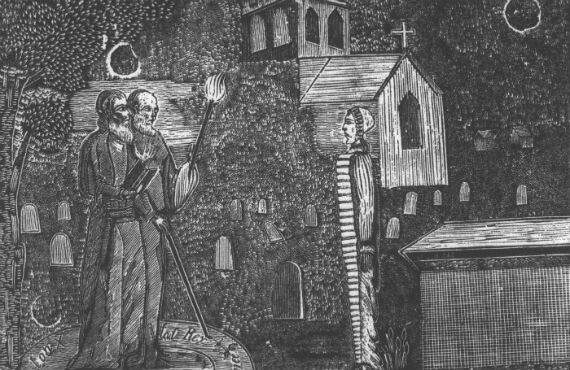Penn Researchers Examine History, Beliefs and Rituals Tied to Ghosts
A group of scholars at the University of Pennsylvania is actively engaged in the scholarly examination of the history of beliefs in ghosts and the phenomenon of ghost hunting.
Justin McDaniel, professor and chair of the religious studies department at Penn, is director of the Penn Ghost Project, a Faculty Working Group of the School of Arts and Sciences.
Formed last spring, the group is comprised of faculty from literature, art history, nursing, archaeology, religious studies, the history and sociology of science and medicine.
“Either we’re all crazy,” McDaniel says, “or ghosts are a part of human phenomena and have been a mass phenomenon for a long, long time.”
This fall the Penn Ghost Project presented its first public event, a symposium on interdisciplinary approaches to studying the other-worldly. In the year ahead, the faculty research team will focus on the intersection of ghosts, healing and health care.
McDaniel became familiar with rituals to “call and petition” ghosts as healers when he spent time as a Buddhist monk in Southeast Asia. There, he learned about the practice of harvesting body parts and fluids from the deceased to create amulets to protect wearers from harm.
His experiences led to his award winning book on ghost protection and healing called The Lovelorn Ghost and the Magical Monk: Practicing Buddhism in Modern Thailand.
Other faculty affiliated with the Penn Ghost Project include David Barnes, Marjorie Muecke, Projit Mukharji, Ilya Vinitsky and Joyce White.
McDaniel believes it’s no coincidence that they all ended up teaching at Penn, a first-rank research institution. The convergence of so many scholars with research strands that involve ghosts, is, however, uncanny.
“It was kind of odd that we all came here,” he says. “We might have already been a center for scholarly ghost research in America and didn’t even know it.”
Penn Ghost Project scholars’ areas of research are wide ranging.
McDaniel has taught graduate courses on death and the afterlife in Buddhist cultures and currently teaches a religious studies course called Gods, Ghosts and Monsters.
David Barnes, associate professor of the history and sociology of science, has conducted in-depth interviews of paranormal investigators who’ve been active in preservation efforts at the Lazaretto, a quarantine station that operated outside Philadelphia on the Delaware River in 1801-1895. He has informally observed many paranormal enthusiasts at the site and is writing a history of the Lazaretto.
Marjorie Muecke, assistant dean for global health affairs in the School of Nursing, is a specialist in traditional healing and nursing practices, infant death and midwifery in Thailand. For more than 30 years she has studied ghost belief in Laos and the ways ghosts are invoked and used in healing ceremonies.
Projit Mukharji, assistant professor of the history and sociology of science, is a historian of modern South Asia, working particularly on eastern India and Bangladesh and specializing on the history of medicine, healing and technology. His latest research project is a history of ghosts and healing practices in India.
Ilya Vinitsky, professor and chair of Slavic languages and literature, researches the history of Russian mystical awakenings and interactions between Russian literature and various spiritualist and occult trends originating in the West.
Penn Museum archaeologist Joyce White is a specialist in the pre-literate cultures of Laos and has done extensive excavations on burial sites in the region. Her findings have uncovered early practices in preparing for the afterlife.
The Penn Ghost Project faculty team is organizing a major lecture for the spring semester and is planning a series of small group tours of Philadelphia area sites where people have claimed to have seen ghosts, such as the Lazaretto quarantine station and Eastern State Penitentiary, which operated from 1829 to 1971.








